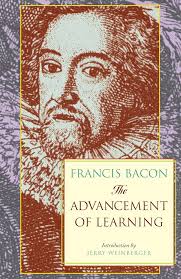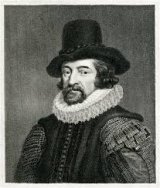The Advancement of Learning Page #24
The Advancement of Learning, published by Francis Bacon in 1605, is a foundational text in the history of science and philosophy. In this work, Bacon advocates for empirical research and the systematic organization of knowledge, laying the groundwork for the scientific method. The book critiques existing scholarly practices and proposes a new approach to learning based on observation and experimentation. It marks a significant shift towards modern scientific inquiry.
- Year:
- 1605
- 1,164 Views
Submitted by acronimous on August 11, 2024
Modified by acronimous on August 11, 2024
world). Registers are collections of public acts, as decrees of council, judicial proceedings, declarations and letters of estate, orations, and the like, without a perfect continuance or contexture of the thread of the narration. (3) Antiquities, or remnants of history, are, as was said, tanquam tabula naufragii: when industrious persons, by an exact and scrupulous diligence and observation, out of monuments, names, words, proverbs, traditions, private records and evidences, fragments of stories, passages of books that concern not story, and the like, do save and recover somewhat from the deluge of time. (4) In these kinds of unperfect histories I do assign no deficience, for they are tanquam imperfecte mista; and therefore any deficience in them is but their nature. As for the corruptions and moths of history, which are epitomes, the use of them deserveth to be banished, as all men of sound judgment have confessed, as those that have fretted and corroded the sound bodies of many excellent histories, and wrought them into base and unprofitable dregs. (5) History, which may be called just and perfect history, is of three kinds, according to the object which it propoundeth, or pretendeth to represent: for it either representeth a time, or a person, or an action. The first we call chronicles, the second lives, and the third narrations or relations. Of these, although the first be the most complete and absolute kind of history, and hath most estimation and glory, yet the second excelleth it in profit and use, and the third in verity and sincerity. For history of times representeth the magnitude of actions, and the public faces and deportments of persons, and passeth over in silence the smaller passages and motions of men and matters. But such being the workmanship of God, as He doth hang the greatest weight upon the smallest wires, maxima è minimis, suspendens, it comes therefore to pass, that such histories do rather set forth the pomp of business than the true and inward resorts thereof. But lives, if they be well written, propounding to themselves a person to represent, in whom actions, both greater and smaller, public and private, have a commixture, must of necessity contain a more true, native, and lively representation. So again narrations and relations of actions, as the war of Peloponnesus, the expedition of Cyrus Minor, the conspiracy of Catiline, cannot but be more purely and exactly true than histories of times, because they may choose an argument comprehensible within the notice and instructions of the writer: whereas he that undertaketh the story of a time, specially of any length, cannot but meet with many blanks and spaces, which he must be forced to fill up out of his own wit and conjecture. (6) For the history of times, I mean of civil history, the providence of God hath made the distribution. For it hath pleased God to ordain and illustrate two exemplar states of the world for arms, learning, moral virtue, policy, and laws; the state of Græcia and the state of Rome; the histories whereof occupying the middle part of time, have more ancient to them histories which may by one common name be termed the antiquities of the world; and after them, histories which may be likewise called by the name of modern history. (7) Now to speak of the deficiences. As to the heathen antiquities of the world it is in vain to note them for deficient. Deficient they are no doubt, consisting most of fables and fragments; but the deficience cannot be holpen; for antiquity is like fame, caput inter nubila condit, her head is muffled from our sight. For the history of the exemplar states, it is extant in good perfection. Not but I could wish there were a perfect course of history for Græcia, from Theseus to Philopœmen (what time the affairs of Græcia drowned and extinguished in the affairs of Rome), and for Rome from Romulus to Justinianus, who may be truly said to be ultimus Romanorum. In which sequences of story the text of Thucydides and Xenophon in the one, and the texts of Livius, Polybius, Sallustius, Cæsar, Appianus, Tacitus, Herodianus in the other, to be kept entire, without any diminution at all, and only to be supplied and continued. But this is a matter of magnificence, rather to be commended than required; and we speak now of parts of learning supplemental, and not of supererogation. (8) But for modern histories, whereof there are some few very worthy, but the greater part beneath mediocrity, leaving the care of foreign stories to foreign states, because I will not be curiosus in aliena republica, I cannot fail to represent to your Majesty the unworthiness of the history of England in the main continuance thereof, and the partiality and obliquity of that of Scotland in the latest and largest author that I have seen: supposing that it would be honour for your Majesty, and a work very memorable, if this island of Great Britain, as it is now joined in monarchy for the ages to come, so were joined in one history for the times passed, after the manner of the sacred history, which draweth down the story of the ten tribes and of the two tribes as twins together. And if it shall seem that the greatness of this work may make it less exactly performed, there is an excellent period of a much smaller compass of time, as to the story of England; that is to say, from the uniting of the Roses to the uniting of the kingdoms; a portion of time wherein, to my understanding, there hath been the rarest varieties that in like number of successions of any hereditary monarchy hath been known. For it beginneth with the mixed adoption of a crown by arms and title; an entry by battle, an establishment by marriage; and therefore times answerable, like waters after a tempest, full of working and swelling, though without extremity of storm; but well passed through by the wisdom of the pilot, being one of the most sufficient kings of all the number. Then followeth the reign of a king, whose actions, howsoever conducted, had much intermixture with the affairs of Europe, balancing and inclining them variably; in whose time also began that great alteration in the state ecclesiastical, an action which seldom cometh upon the stage. Then the reign of a minor; then an offer of a usurpation (though it was but as febris ephemera). Then the reign of a queen matched with a foreigner; then of a queen that lived solitary and unmarried, and yet her government so masculine, as it had greater impression and operation upon the states abroad than it any ways received from thence. And now last, this most happy and glorious event, that this island of Britain, divided from all the world, should be united in itself, and that oracle of rest given to ÆNeas, antiquam exquirite matrem, should now be performed and fulfilled upon the nations of England and Scotland, being now reunited in the
Translation
Translate and read this book in other languages:
Select another language:
- - Select -
- 简体中文 (Chinese - Simplified)
- 繁體中文 (Chinese - Traditional)
- Español (Spanish)
- Esperanto (Esperanto)
- 日本語 (Japanese)
- Português (Portuguese)
- Deutsch (German)
- العربية (Arabic)
- Français (French)
- Русский (Russian)
- ಕನ್ನಡ (Kannada)
- 한국어 (Korean)
- עברית (Hebrew)
- Gaeilge (Irish)
- Українська (Ukrainian)
- اردو (Urdu)
- Magyar (Hungarian)
- मानक हिन्दी (Hindi)
- Indonesia (Indonesian)
- Italiano (Italian)
- தமிழ் (Tamil)
- Türkçe (Turkish)
- తెలుగు (Telugu)
- ภาษาไทย (Thai)
- Tiếng Việt (Vietnamese)
- Čeština (Czech)
- Polski (Polish)
- Bahasa Indonesia (Indonesian)
- Românește (Romanian)
- Nederlands (Dutch)
- Ελληνικά (Greek)
- Latinum (Latin)
- Svenska (Swedish)
- Dansk (Danish)
- Suomi (Finnish)
- فارسی (Persian)
- ייִדיש (Yiddish)
- հայերեն (Armenian)
- Norsk (Norwegian)
- English (English)
Citation
Use the citation below to add this book to your bibliography:
Style:MLAChicagoAPA
"The Advancement of Learning Books." Literature.com. STANDS4 LLC, 2025. Web. 8 Mar. 2025. <https://www.literature.com/book/the_advancement_of_learning_3165>.








Discuss this The Advancement of Learning book with the community:
Report Comment
We're doing our best to make sure our content is useful, accurate and safe.
If by any chance you spot an inappropriate comment while navigating through our website please use this form to let us know, and we'll take care of it shortly.
Attachment
You need to be logged in to favorite.
Log In